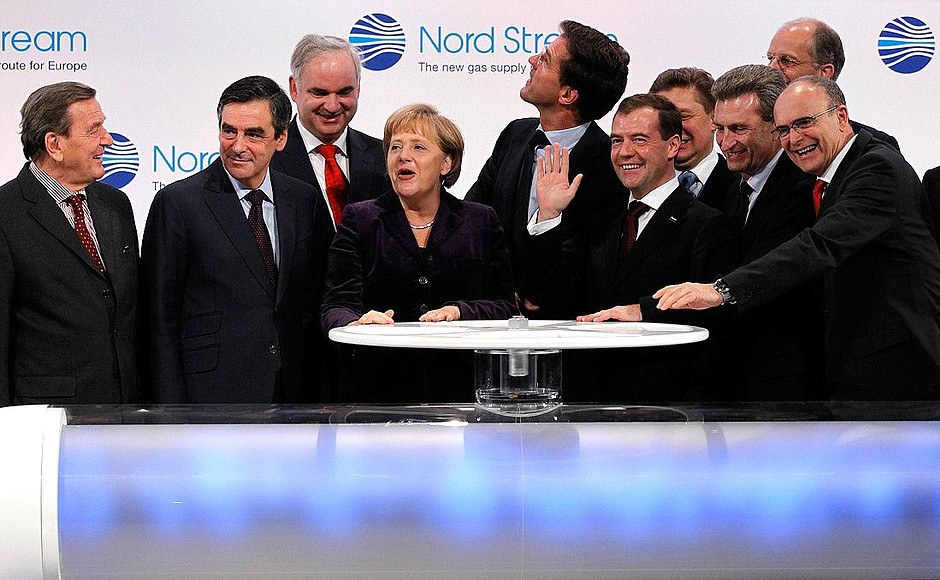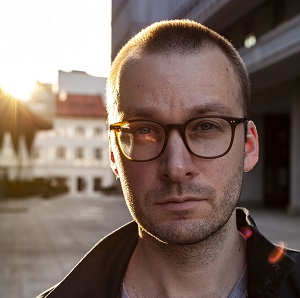By Philipp Fritz
Germany has long dismissed concerns from Poland and other EU partners regarding the Nord Stream pipelines bringing gas from Russia. But the poisoning of Alexei Navalny could mark a tipping point, with more voices in Germany demanding a tougher stance towards Moscow.
It is one of the most famous photographs related to the controversial Nord Stream gas pipeline project. In 2011, a smiling German chancellor Angela Merkel symbolically turned on one of the pipes alongside then Russian president Dmitry Medvedev and Gazprom CEO Alexey Miller at a jubilant opening ceremony attended by prominent guests from Germany’s political and business elite.
On the left of the picture stood Gerhard Schröder, Merkel’s predecessor. Although he was not in the centre, no other German politician has had a bigger influence on the project. Two weeks before leaving office as chancellor in 2005, he signed the deal to create the pipeline. The next month, he confirmed he would become chairman of the board of Nord Stream AG, the consortium that operates Nord Stream 1.
A close friend of Vladimir Putin, whom he once called a “flawless democrat”, Schröder has been the most influential lobbyist for both the original Nord Stream 1 and the current Nord Stream 2 project, which consists of two additional pipelines that will double Nord Stream’s capacity to 110 billion cubic metres.
The picture of that opening ceremony also symbolises the bipartisan support Nord Stream has enjoyed in Germany. Merkel and Schröder are members of Germany’s two biggest political parties, the centre-right Christian Democratic Union (CDU), and centre-left Social Democrats (SPD). Since the founding of democratic Germany after the Second World War, the government has always been led by one (and occasionally both) of the two parties.
Today, almost ten years later, those times of harmony and confidence seem to be over. The Nord Stream story recently took an unexpected turn – and the aforementioned picture could be replaced by another of a different kind: of Russian opposition activist Alexei Navalny, surrounded by his family, after he awoke from a coma at Berlin’s Charité hospital.
A special laboratory of the Bundeswehr, and later laboratories in France and Sweden, confirmed that Navalny was poisoned with a Novichok agent, a chemical weapon. Most experts and observers see Russia as responsible.
After a long period in which Russia has repeatedly breached international law and standards – through the illegal annexation of Crimea, electoral meddling, military engagement in eastern Ukraine and Syria, the Skripal poisoning and the murder of a Chechen rebel commander in Berlin’s Tiergarten park – it looks as if we may have now reached a tipping point.
After the Navalny poisoning, more and more German lawmakers are demanding a tougher position on Russia. Some even want to withdraw from or impose sanctions on the Nord Stream 2 pipeline, construction of which should be completed this year.
Among them is influential CDU politician Norbert Röttgen, chairman of the Committee on Foreign Affairs of the Bundestag. According to government spokesperson Steffen Seibert, even Merkel is no longer ruling out the possibility that the pipeline could be affected by sanctions against Russia.
This is a remarkable turnaround. For years German lawmakers have said, in response to all criticism from EU partners, that Nord Stream 2 is first and foremost a private business project, not a political one.
Although the SPD, Merkel’s coalition partner, and prime ministers of eastern German states still back the project, an honest and open public discussion has finally begun in Germany about to what extent Nord Stream 2 is in Germany’s and the EU’s interest. It could lead to the project being cancelled or frozen.
Nobody would be happier about that than the Polish government. From the beginning, even before the construction of Nord Stream 1 started, Warsaw was the most outspoken critic of the German-Russian pipeline. Politicians of all parties see it as a danger to Polish interests and European energy security. Polish demands sometimes sound exaggerated, especially to German ears, but they make clear how urgent the topic is for Warsaw.
“Poland is sensitive to corridors and agreements over its head. That is the tradition of Locarno. That is the tradition of the Ribbentrop-Molotov Pact,” said Radoslaw Sikorski, then Polish defence minister and now in opposition, at a Brussels summit in 2006. This is probably the most famous criticism of the Nord Stream pipeline, and it is well remembered in Berlin.
Today, after the poisoning of Navalny, politicians of the currently ruling Law and Justice (PiS) party regularly repeat such criticism and may now have more luck than Sikorski.
Nord Stream 1 already connects Russia and Germany directly between Vyborg in Russia and Lubmin in the German state of Mecklenburg-Vorpommern, which, by the way, lies in the constituency of Angela Merkel. The pipeline thereby bypasses the countries of Central and Eastern Europe – the EU member states of Poland, Lithuania, Latvia and Estonia, as well as Ukraine.
The fear in Warsaw is that Poland and its neighbours could be subject to Russian blackmail, even more so if Nord Stream 2 is completed. Ukraine, which has been a victim of Russian aggression, is a worrying example for Poland.
Arguments by German officials that Poland might benefit from so-called reverse flow gas – Russian gas that reaches Poland via Germany – have not allayed concerns on the Polish side. Instead, it is Warsaw’s goal to become fully independent of Russian gas by 2022. One tool to reach that goal is a project that Poland does not often discuss prominently, because it is perhaps not quite in keeping with the country’s claims of a moral stance on Nord Stream.
That project is the Baltic Pipe, a pipeline of its own that Poland is building to transport Norwegian gas via Denmark. It will, albeit with a much smaller capacity, compete with Nord Stream. And if the second German-Russian pipeline does not go online, the Polish project is in a better position because of that.
The country could become a kind of energy hub in Central and Eastern Europe. Poland theoretically then could provide customers with gas that would otherwise have been provided through Nord Stream. That ambition does not, however, downplay Poland’s valid concerns towards Nord Stream. But it is something one should take into account. Poland, too, has business interests.
When we talk about resources and pipelines in Germany and Central and Eastern Europe we must remember that this an amalgamation of business and security interests. It is underlaid with historic images, partially stereotypes or a self-perception as a mere region between two centres of gravity, Germany and Russia – Zwischeneuropa, to use a term used in 19th-century Germany.
Nothing could me more wrong, especially since Poland and others joined the EU in 2004. But all that makes discussions about Nord Stream 2 horribly complicated, and at times emotional.
The criticism of the project was not always fair or polite, but the truth is: Germany has lost trust, especially in Poland, by pushing Nord Stream 2 forward against all arguments.
Although PiS has found a powerful partner in Donald Trump in the White House, who rages just as loudly against Nord Stream 2 as Poland’s government does, the American president’s suggestions of sanctioning Germany or companies involved with Nord Stream have actually had a counterproductive effect. Even German politicians who are critical towards Nord Stream 2 are opposed to American sanctions and Trump’s rhetoric.
Now it is a Russian opposition activist – or rather his poisoning – that might bring an early end to the project. But jubilation in Warsaw would be premature. The word “might” must be emphasised here. The fact that politicians in Germany have started questioning the project does not mean that they will ultimately change their minds.
Main image credit: kremlin.ru (under CC BY 4.0)





















